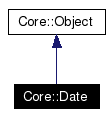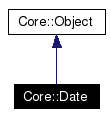
#include <Date.h>
Inheritance diagram for Core::Date:


Public Member Functions | |
| Date (int month=1, int day=1, int year=1900) | |
| virtual String * | className (void) const |
| Answer receiver class name. | |
| virtual int | month (void) const |
| Answer the month. | |
| virtual int | day (void) const |
| Answer the day of the month. | |
| virtual int | year (void) const |
| Answer the year. | |
| virtual int | weekday (void) const |
| Answer the weekday. | |
| virtual int | century (void) const |
| Answer the century. | |
| virtual Date * | addDays (int dayCount) |
| Adds the given number of days to the current date. | |
| virtual Date * | addMonths (int monthCount) |
| Adds the given number of months to the current date. | |
| virtual Date * | addYears (int yearCount) |
| Adds the given number of years to the current date. | |
| virtual Date * | subtractDays (int dayCount) |
| virtual Date * | subtractMonths (int monthCount) |
| virtual Date * | subtractYears (int yearCount) |
| virtual unsigned long | dayDifferenceFrom (Date *date) |
| virtual long | hash (void) const |
| Answer object hash value. | |
| virtual bool | isEqual (const Object *object) const |
| Compare receiver with given object. | |
| virtual bool | isEqual (const Object &object) const |
| Compare receiver with given object. | |
| virtual unsigned long | asDays (void) const |
| virtual void | printOn (Stream *stream) const |
| Print object identification into the stream. | |
| virtual bool | isLeapYear (void) const |
| Determines if the Date's year is a leap year. | |
Static Public Member Functions | |
| static Date * | today (void) |
| static int | daysInMonth (int month, int year) |
| static bool | isLeapYear (short year) |
| Determines if the given year is a leap year. | |
Protected Member Functions | |
| void | gregorianDate (int &month, int &day, int &year) const |
Static Protected Member Functions | |
| static unsigned long | julianDay (int month, int day, int year) |
Protected Attributes | |
| unsigned long | julian_day_number |
Private Member Functions | |
| Date (unsigned long julianDate) | |
|
|
Definition at line 32 of file Date.cc. References julian_day_number. Referenced by addDays(), addMonths(), addYears(), subtractDays(), subtractMonths(), subtractYears(), and today(). 00033 {
00034 julian_day_number = julianDate;
00035 }
|
|
||||||||||||||||
|
Definition at line 37 of file Date.cc. References julian_day_number, and julianDay(). 00038 {
00039 julian_day_number = julianDay(month, day, year);
00040 }
|
|
|
Adds the given number of days to the current date. If the month/day combination isn't valid, the month rolls over. Definition at line 110 of file Date.cc. References Date(), and julian_day_number. 00111 {
00112 return new Date(julian_day_number + dayCount);
00113 }
|
|
|
Adds the given number of months to the current date. If the month/day combination isn't valid, the day is cut down. For example, adding 1 month to Jan 30 on a non leap year will result in the date Feb 28. Definition at line 120 of file Date.cc. References Date(), daysInMonth(), and gregorianDate(). 00121 {
00122 int m, d, y;
00123 gregorianDate(m, d, y);
00124 m += monthCount;
00125 while (m > 12) {
00126 m -= 12; y += 1;
00127 }
00128 int dm = daysInMonth(m, y);
00129 if (d > dm) d = dm;
00130 return new Date(m, d, y);
00131 }
|
|
|
Adds the given number of years to the current date. If the month/day/year combination isn't valid, the month/day rolls over. Definition at line 136 of file Date.cc. References Date(), and gregorianDate(). 00137 {
00138 int m, d, y;
00139 gregorianDate(m, d, y);
00140 return new Date(m, d, y+yearCount);
00141 }
|
|
|
Definition at line 191 of file Date.cc. References julian_day_number. Referenced by dayDifferenceFrom(). 00192 {
00193 return julian_day_number;
00194 }
|
|
|
Answer the century.
Definition at line 93 of file Date.cc. References year(). 00094 {
00095 return year() / 100;
00096 }
|
|
|
Answer receiver class name. Because there isn't any standard way to obtain class name this method comes to place. Every class should rewrite this method but many didn't (yet). Reimplemented from Core::Object. Definition at line 43 of file Date.cc. 00044 {
00045 return new String("Date");
00046 }
|
|
|
Answer the day of the month.
Definition at line 66 of file Date.cc. References gregorianDate(). Referenced by Core::Timestamp::fromDateAndTime(). 00067 {
00068 int m, d, y;
00069 gregorianDate(m, d, y);
00070 return d;
00071 }
|
|
|
Definition at line 168 of file Date.cc. References asDays(). 00169 {
00170 unsigned long myDays, dateDays;
00171 myDays = asDays();
00172 dateDays = date->asDays();
00173 if (myDays > dateDays)
00174 return myDays - dateDays;
00175 return dateDays - myDays;
00176 }
|
|
||||||||||||
|
Definition at line 98 of file Date.cc. References days_in_month, and isLeapYear(). Referenced by addMonths(), and subtractMonths(). 00099 {
00100 int dayCount = days_in_month[month];
00101 if (month == 2 && isLeapYear(year)) // Take care of February
00102 dayCount = 29;
00103 return dayCount;
00104 }
|
|
||||||||||||||||
|
Definition at line 247 of file Date.cc. References julian_day_number. Referenced by addMonths(), addYears(), day(), month(), printOn(), subtractMonths(), subtractYears(), and year(). 00248 {
00249 unsigned long j = julian_day_number - 1721119;
00250 unsigned long y = ((j<<2) - 1) / 146097;
00251 j = (j<<2) - 1 - 146097*y;
00252 unsigned long d = j>>2;
00253 j = ((d<<2) + 3) / 1461;
00254 d = (d<<2) + 3 - 1461*j;
00255 d = (d + 4)>>2;
00256 unsigned long m = (5*d - 3)/153;
00257 d = 5*d - 3 - 153*m;
00258 d = (d + 5)/5;
00259 y = 100*y + j;
00260 if (m < 10) m += 3;
00261 else {
00262 m -= 9;
00263 y++;
00264 }
00265 month = (int) m;
00266 day = (int) d;
00267 year = (int) y;
00268 }
|
|
|
Answer object hash value. The value should be same for objects found equal with isEqual() method. So if you rewrite this method you should rewrite isEqual() method too. Reimplemented from Core::Object. Definition at line 179 of file Date.cc. References julian_day_number. Referenced by isEqual(). 00180 {
00181 return (long) julian_day_number;
00182 }
|
|
|
Compare receiver with given object. Do not rewrite this method. It just a sugar for Object::isEqual(Object *).
Reimplemented from Core::Object. Definition at line 92 of file Date.h. References Core::Object::isEqual(). 00093 { return Object::isEqual(object); }
|
|
|
Compare receiver with given object. This method could compare objects with more sophisticated algorithm (eg. based on instance variables comparing or so). If you rewrite this method you should rewrite hash() too.
Reimplemented from Core::Object. Definition at line 184 of file Date.cc. References hash(). 00185 {
00186 if (!object->className()->isEqual(this->className())) return false;
00187 return object->hash() == this->hash();
00188 }
|
|
|
Determines if the given year is a leap year.
Definition at line 215 of file Date.cc.
|
|
|
Determines if the Date's year is a leap year.
Definition at line 209 of file Date.cc. References year(). Referenced by daysInMonth(), and Core::Timestamp::isLeapYear(). 00210 {
00211 return isLeapYear(year());
00212 }
|
|
||||||||||||||||
|
Definition at line 228 of file Date.cc. Referenced by Date(). 00229 {
00230 unsigned long c, ya;
00231 if (month > 2) month -= 3;
00232 else {
00233 month += 9;
00234 year--;
00235 }
00236 ya = year % 100;
00237 c = year / 100;
00238 return ((146097*c)>>2) + ((1461*ya)>>2) + (153*month + 2)/5 + day + 1721119;
00239 }
|
|
|
Answer the month. This is a number between 1 and 12. Definition at line 58 of file Date.cc. References gregorianDate(). Referenced by Core::Timestamp::fromDateAndTime(). 00059 {
00060 int m, d, y;
00061 gregorianDate(m, d, y);
00062 return m;
00063 }
|
|
|
Print object identification into the stream. Object identification is formed from its className() by default. But complicated classes (eg. collections) may print some other information.
Reimplemented from Core::Object. Definition at line 197 of file Date.cc. References Core::String::format(), gregorianDate(), and Core::Stream::nextPutAll(). 00198 {
00199 /* Print self in numbers. Locale should know month names. */
00200 String *dateStr;
00201 int m, d, y;
00202 gregorianDate(m, d, y);
00203 dateStr = String::format("%u.%u.%u", d, m, y);
00204 stream->nextPutAll(dateStr);
00205 }
|
|
|
Definition at line 143 of file Date.cc. References Date(), and julian_day_number. 00144 {
00145 return new Date(julian_day_number - dayCount);
00146 }
|
|
|
Definition at line 148 of file Date.cc. References Date(), daysInMonth(), and gregorianDate(). 00149 {
00150 int m, d, y;
00151 gregorianDate(m, d, y);
00152 m -= monthCount;
00153 while (m <= 0) {
00154 m += 12; y -= 1;
00155 }
00156 int dm = daysInMonth(m, y);
00157 if (d > dm) d = dm;
00158 return new Date(m, d, y);
00159 }
|
|
|
Definition at line 161 of file Date.cc. References Date(), and gregorianDate(). 00162 {
00163 int m, d, y;
00164 gregorianDate(m, d, y);
00165 return new Date(m, d, y-yearCount);
00166 }
|
|
|
Definition at line 49 of file Date.cc. References Date(). 00050 {
00051 time_t timestamp = time(NULL);
00052 const struct tm* date = localtime(×tamp);
00053 return new Date(date->tm_mon+1, date->tm_mday, date->tm_year+1900);
00054 }
|
|
|
Answer the weekday. 1 for Monday, 7 for Sunday Definition at line 82 of file Date.cc. References julian_day_number. 00088 {
00089 return ((((julian_day_number + 1) % 7) + 6) % 7) + 1;
00090 }
|
|
|
Answer the year.
Definition at line 74 of file Date.cc. References gregorianDate(). Referenced by century(), Core::Timestamp::fromDateAndTime(), and isLeapYear(). 00075 {
00076 int m, d, y;
00077 gregorianDate(m, d, y);
00078 return y;
00079 }
|
|
|
Definition at line 38 of file Date.h. Referenced by addDays(), asDays(), Date(), gregorianDate(), hash(), subtractDays(), and weekday(). |
 1.4.2
1.4.2